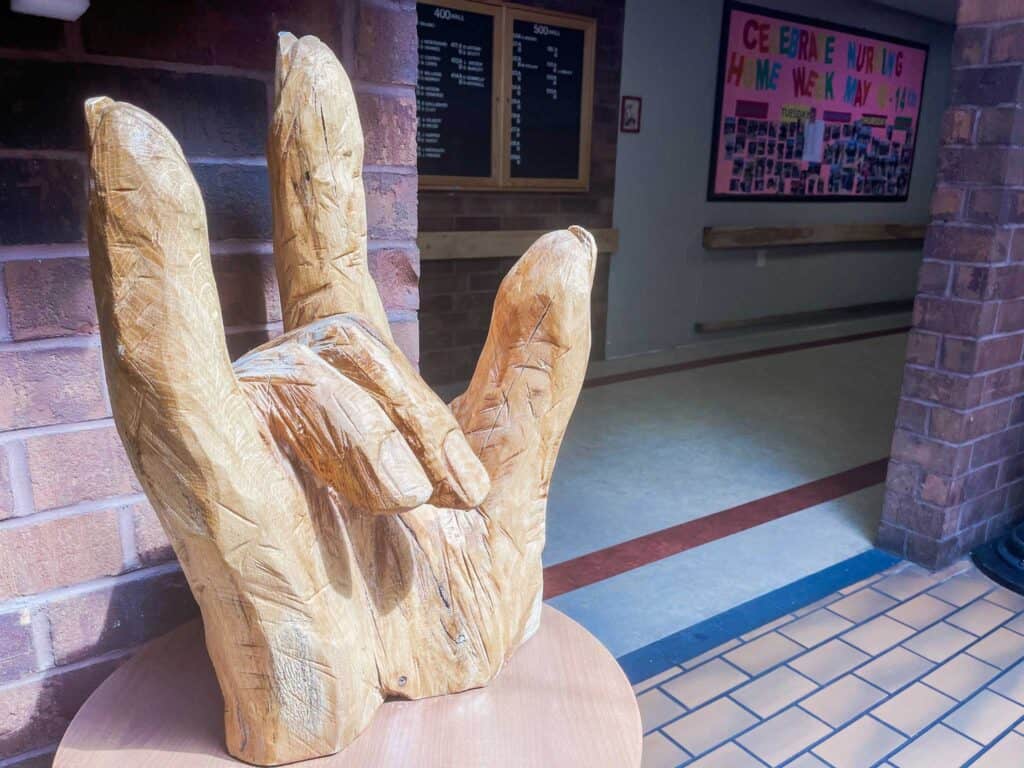Residents and Staff Lead CCEC’s National Deaf History Month Celebration

United Church Homes (UCH) community Columbus Colony for Elderly Care (CCEC), located in Westerville, Ohio, is noteworthy year-round for many reasons. It is one of only seven facilities in the United States at which deaf older adults can receive skilled nursing care in an environment culturally sensitive to their needs. If that alone did not make it worthy of praise, it is also unique in two other ways. It is the only skilled nursing community in Ohio that serves deaf, deaf-blind, and hard of hearing individuals. It is also the only deaf-owned community in the United States.
The partnership between UCH and CCEC began in early 2020 noted the Rev. Kenneth Daniel, president and CEO of UCH, who reports it’s expanding to include two more properties owned by CCEC. This expansion builds on the trust the organizations have built together. “We needed to build trust because unfortunately, the experience of the deaf community with the hearing world isn’t always positive. We have to overcome some perceptions on both sides,” recalled Daniel.
April is National Deaf History Month, and both UCH and the Council for Health and Human Service Ministries are highlighting the work of CCEC and its commitment to empowering deaf individuals to shape their history through the telling of their stories. CCEC is prominently featuring its staff and residents telling their own stories on their social media this month. Stories told on Facebook can the found here.
The History of CCEC
Originally founded as the Ohio Home for the Deaf, CCEC has operated consistently since its inception in 1896. Today, it is owned by the Ohio School for the Deaf Alumni Association and operated as a nonprofit for the deaf by the deaf. The community does welcome and has hearing individuals among its ranks, but its commitment to serving the community it was founded to serve is critical to its core and operations. CCEC serves on average approximately 90 individuals. At present, about 65 are deaf or deaf-blind.
“It’s a community that’s not often given the opportunity to have a voice and be in direct control of their own destiny. We do that here at CCEC,” said Executive Director Seth Ghering. “This is certainly the best opportunity that I’ve had in engaging with a mission and with a culture and community that has allowed me to and be a part of it.”
“They have been kind and patient with me as I learn American Sign Language,” Ghering continued. “I want to get people to understand CCEC is here and valuable and share the message and meaning of this community.“
The History of Celebrating Deaf History Month
While in 2023, National Deaf History Month is being celebrated in April, it was originally celebrated March 13 through April 15. When it was first established by the National Association of the Deaf (NAD) in 1997, National Deaf History Month began and ended on dates of significance to deaf history. The celebration began on March 13, commemorating the date on which Gallaudet University –which was founded in 1864 as the first institution of higher education for the deaf and hard of hearing –appointed its first deaf president in 1988. The month’s conclusion on April 15 recognized the date in 1817 on which America’s first public school for the deaf was opened.
While it recognized these milestones as important, NAD’s decision to move the start of the celebration sought to expand the conversation beyond educational milestones to acknowledge the full richness of deaf history and culture.
“[I] think that NAD had the right mindset to change the date to April 1…from here we can learn about deaf culture and how the world has shaped our lives,” explains CCEC Social Services director Kristyn Eck. Kristyn shared a more in-depth explanation as part of CCEC’s celebration that is available on CCEC’s Facebook page.
This Year’s Celebration at CCEC
CCEC’s Ghering wants the celebration of deaf history to be rooted in and told by the stories of deaf, deaf-blind, and the hard of hearing. He is quick to direct those who want to learn more and celebrate the month to see what CCEC is posting to social media.
“Whenever possible, we should have the deaf tell their own stories,” he noted. “This gives them a chance to tell their story, but it also gives them a chance to know [that] their history and perspective is important, valued, and cherished. We really need that to guide it moving forward.”
Join Our Mailing LIst
"*" indicates required fields
